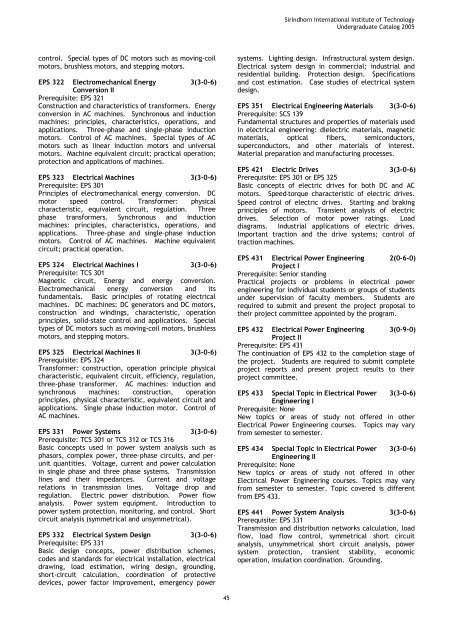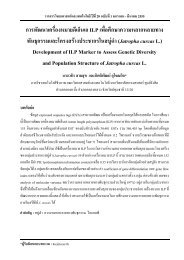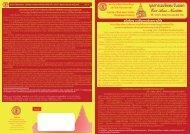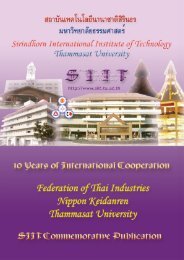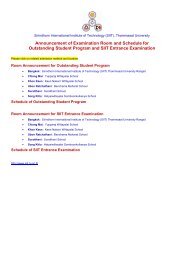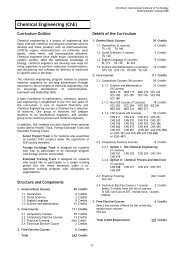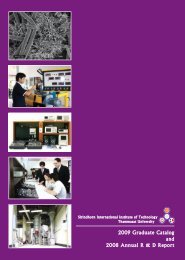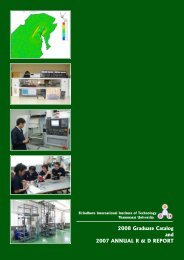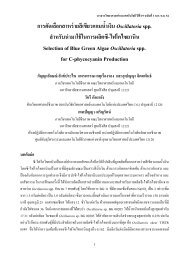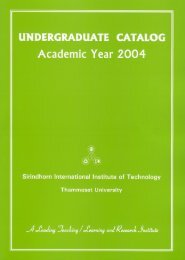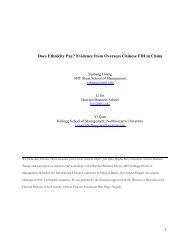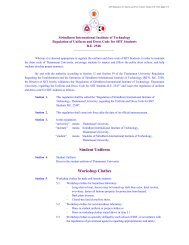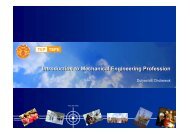Course Description - Sirindhorn International Institute of Technology
Course Description - Sirindhorn International Institute of Technology
Course Description - Sirindhorn International Institute of Technology
You also want an ePaper? Increase the reach of your titles
YUMPU automatically turns print PDFs into web optimized ePapers that Google loves.
<strong>Sirindhorn</strong> <strong>International</strong> <strong>Institute</strong> <strong>of</strong> <strong>Technology</strong><br />
Undergraduate Catalog 2005<br />
control. Special types <strong>of</strong> DC motors such as moving‐coil<br />
motors, brushless motors, and stepping motors.<br />
EPS 322 Electromechanical Energy 3(3‐0‐6)<br />
Conversion II<br />
Prerequisite: EPS 321<br />
Construction and characteristics <strong>of</strong> transformers. Energy<br />
conversion in AC machines. Synchronous and induction<br />
machines: principles, characteristics, operations, and<br />
applications. Three‐phase and single‐phase induction<br />
motors. Control <strong>of</strong> AC machines. Special types <strong>of</strong> AC<br />
motors such as linear induction motors and universal<br />
motors. Machine equivalent circuit; practical operation;<br />
protection and applications <strong>of</strong> machines.<br />
EPS 323 Electrical Machines 3(3‐0‐6)<br />
Prerequisite: EPS 301<br />
Principles <strong>of</strong> electromechanical energy conversion. DC<br />
motor speed control. Transformer: physical<br />
characteristic, equivalent circuit, regulation. Three<br />
phase transformers. Synchronous and induction<br />
machines: principles, characteristics, operations, and<br />
applications. Three‐phase and single‐phase induction<br />
motors. Control <strong>of</strong> AC machines. Machine equivalent<br />
circuit; practical operation.<br />
EPS 324 Electrical Machines I 3(3‐0‐6)<br />
Prerequisite: TCS 301<br />
Magnetic circuit, Energy and energy conversion.<br />
Electromechanical energy conversion and its<br />
fundamentals. Basic principles <strong>of</strong> rotating electrical<br />
machines. DC machines: DC generators and DC motors,<br />
construction and windings, characteristic, operation<br />
principles, solid‐state control and applications. Special<br />
types <strong>of</strong> DC motors such as moving‐coil motors, brushless<br />
motors, and stepping motors.<br />
EPS 325 Electrical Machines II 3(3‐0‐6)<br />
Prerequisite: EPS 324<br />
Transformer: construction, operation principle physical<br />
characteristic, equivalent circuit, efficiency, regulation,<br />
three‐phase transformer. AC machines: induction and<br />
synchronous machines: construction, operation<br />
principles, physical characteristic, equivalent circuit and<br />
applications. Single phase induction motor. Control <strong>of</strong><br />
AC machines.<br />
EPS 331 Power Systems 3(3‐0‐6)<br />
Prerequisite: TCS 301 or TCS 312 or TCS 316<br />
Basic concepts used in power system analysis such as<br />
phasors, complex power, three‐phase circuits, and perunit<br />
quantities. Voltage, current and power calculation<br />
in single phase and three phase systems. Transmission<br />
lines and their impedances. Current and voltage<br />
relations in transmission lines. Voltage drop and<br />
regulation. Electric power distribution. Power flow<br />
analysis. Power system equipment. Introduction to<br />
power system protection, monitoring, and control. Short<br />
circuit analysis (symmetrical and unsymmetrical).<br />
EPS 332 Electrical System Design 3(3‐0‐6)<br />
Prerequisite: EPS 331<br />
Basic design concepts, power distribution schemes,<br />
codes and standards for electrical installation, electrical<br />
drawing, load estimation, wiring design, grounding,<br />
short‐circuit calculation, coordination <strong>of</strong> protective<br />
devices, power factor improvement, emergency power<br />
systems. Lighting design. Infrastructural system design.<br />
Electrical system design in commercial; industrial and<br />
residential building. Protection design. Specifications<br />
and cost estimation. Case studies <strong>of</strong> electrical system<br />
design.<br />
EPS 351 Electrical Engineering Materials 3(3‐0‐6)<br />
Prerequisite: SCS 139<br />
Fundamental structures and properties <strong>of</strong> materials used<br />
in electrical engineering: dielectric materials, magnetic<br />
materials, optical fibers, semiconductors,<br />
superconductors, and other materials <strong>of</strong> interest.<br />
Material preparation and manufacturing processes.<br />
EPS 421 Electric Drives 3(3‐0‐6)<br />
Prerequisite: EPS 301 or EPS 325<br />
Basic concepts <strong>of</strong> electric drives for both DC and AC<br />
motors. Speed-torque characteristic <strong>of</strong> electric drives.<br />
Speed control <strong>of</strong> electric drives. Starting and braking<br />
principles <strong>of</strong> motors. Transient analysis <strong>of</strong> electric<br />
drives. Selection <strong>of</strong> motor power ratings. Load<br />
diagrams. Industrial applications <strong>of</strong> electric drives.<br />
Important traction and the drive systems; control <strong>of</strong><br />
traction machines.<br />
EPS 431 Electrical Power Engineering 2(0‐6‐0)<br />
Project I<br />
Prerequisite: Senior standing<br />
Practical projects or problems in electrical power<br />
engineering for individual students or groups <strong>of</strong> students<br />
under supervision <strong>of</strong> faculty members. Students are<br />
required to submit and present the project proposal to<br />
their project committee appointed by the program.<br />
EPS 432 Electrical Power Engineering 3(0‐9‐0)<br />
Project II<br />
Prerequisite: EPS 431<br />
The continuation <strong>of</strong> EPS 432 to the completion stage <strong>of</strong><br />
the project. Students are required to submit complete<br />
project reports and present project results to their<br />
project committee.<br />
EPS 433 Special Topic in Electrical Power 3(3‐0‐6)<br />
Engineering I<br />
Prerequisite: None<br />
New topics or areas <strong>of</strong> study not <strong>of</strong>fered in other<br />
Electrical Power Engineering courses. Topics may vary<br />
from semester to semester.<br />
EPS 434 Special Topic in Electrical Power 3(3‐0‐6)<br />
Engineering II<br />
Prerequisite: None<br />
New topics or areas <strong>of</strong> study not <strong>of</strong>fered in other<br />
Electrical Power Engineering courses. Topics may vary<br />
from semester to semester. Topic covered is different<br />
from EPS 433.<br />
EPS 441 Power System Analysis 3(3‐0‐6)<br />
Prerequisite: EPS 331<br />
Transmission and distribution networks calculation, load<br />
flow, load flow control, symmetrical short circuit<br />
analysis, unsymmetrical short circuit analysis, power<br />
system protection, transient stability, economic<br />
operation, insulation coordination. Grounding.<br />
45


